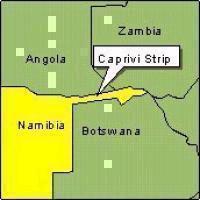







|
News and Information
Second treason trial appeal bid refused
| March 29, 2007 |
 Second treason trial appeal bid refused Second treason trial appeal bid refused
WERNER MENGES
THE 12 men facing charges in the second Caprivi high treason trial cannot at this stage appeal against a ruling that dismissed their bid to be acquitted at the close of the prosecution's case against them.
They were told this in the High Court on Monday, when Acting Judge John Manyarara dismissed their application for leave to appeal against a ruling he made on March 12.
That ruling was the result of arguments by the 12 after the court had heard the evidence of the last of the 53 witnesses that it called to testify.
The 12, who have refused to plead to the charges against them and thereafter refused to cross-examine the State's witnesses, reacted to the close of the State's case by claiming that they had not received a fair trial, that they were not treated equally before the law, and that their human rights had been violated both before and in the course of the trial.
Acting Judge Manyarara again made a series of errors in his ruling in which he did not accept those arguments from the 12, a spokesman from their ranks, Vincent Siliye, argued on Monday, when he tried to convince the court that they should be allowed to appeal to the Supreme Court.
Among the errors, Siliye claimed, was the finding that the 12 had received a fair trial, that they had been treated equally before the law, that their rights had been respected, that they had refused to accept the services of defence lawyers provided by the Directorate of Legal Aid, and that the court had repeatedly explained their rights to them and that they had refused to exercise these rights.
He also argued that the court had made an error when it found - or so Siliye claimed - that the 12, who have said in court that they regarded themselves as Caprivians and not Namibians, are Namibian citizens, that calling themselves Caprivians constitutes a serious crime, and that they are guilty of high treason.
Having heard Siliye's thoughts, Acting Judge Manyarara told the 12 - repeating the core of his statement several times to emphasise the point he was trying to make - that none of them had been found guilty on any charge so far.
What the court had found in its ruling on their discharge application, was that there was sufficient evidence to place them on their defence at the close of the case for the prosecution, he said.
He added that the State had not argued that it had proved its case beyond a reasonable doubt, nor had it argued that it had proved their nationality beyond a reasonable doubt.
It had however placed evidence before the court that on the face of it indicated that the 12 are Namibian citizens, and it was now the right of the 12 to rebut that evidence, Acting Judge Manyarara explained.
"Now is the stage for them to put their evidence before the court, to contradict the evidence that was placed before the court that they are Namibians," he said.
At this stage of the trial, before any verdict and possibly sentence had been handed down, the accused could not take any appeal to the Supreme Court, Acting Judge Manyarara said.
He stressed that the court had so far only found that, on the basis of the evidence presented, the 12 might - and that did not mean should or would - be convicted.
Acting Judge Manyarara also explained to the 12 that they now had the right to testify in their defence or to call witnesses to testify in their defence, but that they were not obliged to do so and that they could elect to remain silent.
When Siliye was asked if that explanation could be handed to the 12 in writing, the suspicion and distrust that has marked the trial since its earliest stages again became apparent.
Siliye told the court that they would not accept a written version of that warning of their rights, because the State was in the habit of "twisting statements" and the court would just accept that.
"We treat this warning statement as intimidation," he said.
Having repeated that he and his co-accused did not regard themselves as part of the trial, Siliye ultimately asked the court to give them time to prepare and an opportunity "to place our side before the court".
That opportunity is set to come their way on April 10.
The 12 face six charges, including counts of high treason, sedition, public violence and illegal importation and possession of firearms and ammunition, in connection with allegations that between September 1998 and December 2003 they had been part of a plan to secede the Caprivi Region.
|
Source: www.namibian.com.na |
| http://www.namibian.com.na/ |
|
| Support Caprivi Freedom |
Fill out the form below to become a member of this site and receive our regular newsletter.
|

|

